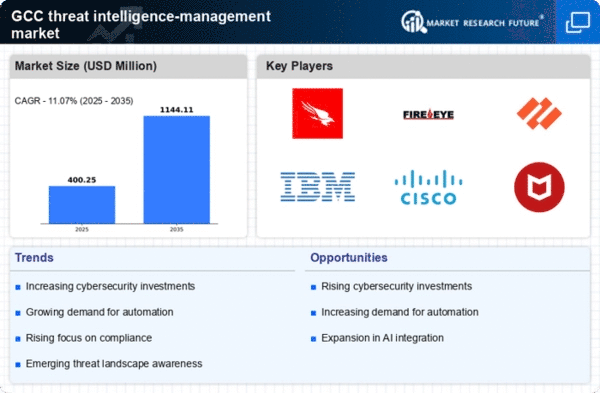Rising Cybersecurity Threats
The escalating frequency and sophistication of cyber threats in the GCC region are driving the demand for the threat intelligence-management market. Organizations are increasingly recognizing the necessity of robust threat intelligence solutions to safeguard their digital assets. In 2025, it is estimated that cybercrime costs could reach $10 trillion globally, with a significant portion attributed to the GCC. This alarming trend compels businesses to invest in advanced threat intelligence systems to mitigate risks and enhance their security posture. The threat intelligence-management market is thus positioned to grow as companies seek to protect sensitive information and maintain operational continuity amidst rising cyber threats.
Growing Awareness of Data Privacy
The increasing awareness of data privacy and protection among consumers and businesses in the GCC is shaping the threat intelligence-management market. With the implementation of stringent data protection laws, organizations are compelled to adopt comprehensive threat intelligence solutions to ensure compliance and safeguard customer information. The GCC's data protection regulations are evolving, with penalties for non-compliance potentially reaching millions of dollars. This heightened focus on data privacy is likely to drive demand for threat intelligence-management solutions, as companies strive to enhance their security frameworks and build trust with their customers.
Emergence of Advanced Technologies
The emergence of advanced technologies such as artificial intelligence, machine learning, and blockchain is transforming the threat intelligence-management market in the GCC. These technologies offer innovative solutions for threat detection, analysis, and response, enabling organizations to stay ahead of cyber adversaries. In 2025, the market for AI in cybersecurity is projected to reach $38 billion, indicating a robust growth trajectory. As businesses increasingly adopt these technologies, the threat intelligence-management market is expected to expand, providing organizations with the tools necessary to enhance their security measures and effectively combat evolving cyber threats.
Government Initiatives and Support
Government initiatives aimed at enhancing cybersecurity frameworks in the GCC are significantly influencing the threat intelligence-management market. Various national strategies are being implemented to bolster cybersecurity resilience, including the establishment of regulatory bodies and the promotion of public-private partnerships. For instance, the UAE's National Cybersecurity Strategy emphasizes the importance of threat intelligence sharing among organizations. Such initiatives are expected to drive investments in the threat intelligence-management market, as businesses align their security practices with government mandates and seek to leverage available resources for improved threat detection and response.
Investment in Digital Transformation
As organizations in the GCC accelerate their digital transformation initiatives, the need for effective threat intelligence-management solutions becomes paramount. The shift towards cloud computing, IoT, and big data analytics introduces new vulnerabilities that necessitate comprehensive threat intelligence strategies. In 2025, the GCC's digital economy is projected to contribute $100 billion to the region's GDP, underscoring the importance of securing digital assets. Consequently, the threat intelligence-management market is likely to experience substantial growth as businesses prioritize cybersecurity measures to protect their digital infrastructures and ensure compliance with evolving regulations.
















